
View Stock/View Stock/Getty Images
Fresh fruits and vegetables, while extremely healthy, can also pose a danger. Some fruits and vegetables are exposed to pests that can carry bacteria and diseases, as well as destroy crops. Exposure of fruits and vegetables to chemical pesticides to deter pests leaves residues that can also harm humans. Washing fruits and vegetables with a solution of potassium permanganate can help eliminate both pesticide residue and harmful bacteria.
Potassium Permanganate Chemistry
Chemically, potassium permanganate consists of one potassium or K ion, one manganese or Mn ion, and four oxygen or O ions, in the chemical formula KMnO4, according to Hepure Technologies. Also known as Condy's crystals, a dilute potassium permanganate solution appears slightly purplish-pink. About 7 grams of pure purple-bronze potassium permanganate crystals can dissolve in about 100 grams of water. Much more dilute solutions are used, however, when washing fresh fruits and vegetables.
Pesticide Residues
Potassium permanganate solutions effectively remove a variety of chemical pesticide residues from fruits and vegetables, making them safer to consume. Dilute solutions will degrade chlorinated solvents, polyaromatic hydrocarbons, phenolics, organo-pesticides and substituted aromatics. As one example, AGRIS, the International Information System for the Agricultural Sciences and Technology, an information management program started by the Food and Agriculture Organization of the United Nations, reported in 2010 that Leafy Chinese-Kale treated with a 0.001 percent potassium permanganate solution effectively removed pesticide residues. Washing vegetables in potassium permanganate removed more pesticide residue than washing in water alone.
Pests
Potassium permanganate removes pesticide residues, but can also reduce the number of pests on the plants themselves. For example, potassium permanganate effectively kills the bacterium that causes cholera, as well as other harmful organisms such as Fasciola, a parasitic flatworm, according to the April 2003 issue of the "Journal of the Egyptian Society of Parasitology." In areas of the world with unsanitary human waste disposal systems and questionable water purification systems, washing fruits and vegetables with a solution of potassium permanganate helps control disease outbreak while at the same time providing local residents access to healthy foods.
Warning
You should use only very dilute solutions of potassium permanganate, about 0.001 percent when washing fruits and vegetables. Concentrated solutions of about 1 percent can harm your gastrointestinal system and could be fatal, causing your throat to burn, as well as nausea, vomiting and abdominal pain, according to its Material Safety Data Sheet. Higher concentrations of potassium permanganate, about 2 percent to 3 percent can cause anemia and swelling of the throat leading to suffocation, and 4 percent to 5 percent can cause kidney damage.
Treatment
Ingestion of diluted solutions of potassium permanganate, particularly the dilute solutions used as antiseptic agents, rarely cause harm. The World Health Organization reports that irritations may occur but are mild and self-limited. Ingestion of large volumes of dilute solutions may cause vomiting and diarrhea, but the amount left on fresh fruits and vegetables after washing would not be large enough to induce these effects.
Related Articles

Safety Hazards of Acetone

What Ingredients Are in Detergent?

The Effects of Organic Fertilizer on ...
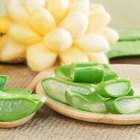
What Is Aloe Good For?
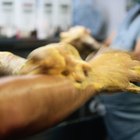
About Hibiclens

Is Proactive Too Strong for Sensitive ...

Subungual Warts and Treatment

Skin Problems Caused by Swimming Pool ...

Ingredients of Fingernail Polish Remover

How to Remove Lye Stains
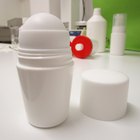
Properties of Propylene Glycol
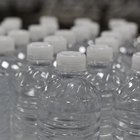
Why Should You Use Filtered Water in a ...

Metamucil Dosage for Cats

Lemon Juice & Health

How to Reduce Acne Inflammation

How to Sterilize Safety Goggles

What Is Camphor Phenol?

How to Get Rid of Yellow Age Spots on ...
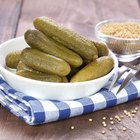
The Advantages of Pickling Foods

Health Dangers of Milestone Herbicide
References
- Journal of the Egyptian Society of Parasitology: The Effect of Potassium Permanganate and Sodium Dichloroisocyanurate on Metacercariae of Fasciola gigantica
- AGRIS: Reduction of Methomyl and Carbaryl Residue in Chinese-Kale by Wash Treatments
- Material Safety Data Sheet: Potassium Permanganate Volumetric Solutions
- Inchem: Potassium Permanganate
- World Health Organization: WHO Model Prescribing Information: Drugs Used in Skin Diseases
Writer Bio
Robin Wasserman has been writing and prosecuting biochemical patents since 1998. She has served as a biochemical patent agent and a research scientist for a gene-therapy company. Wasserman earned her Doctor of Philosophy in biochemistry and molecular biology, graduating from Harvard University in 1995.
Photo Credits
View Stock/View Stock/Getty Images